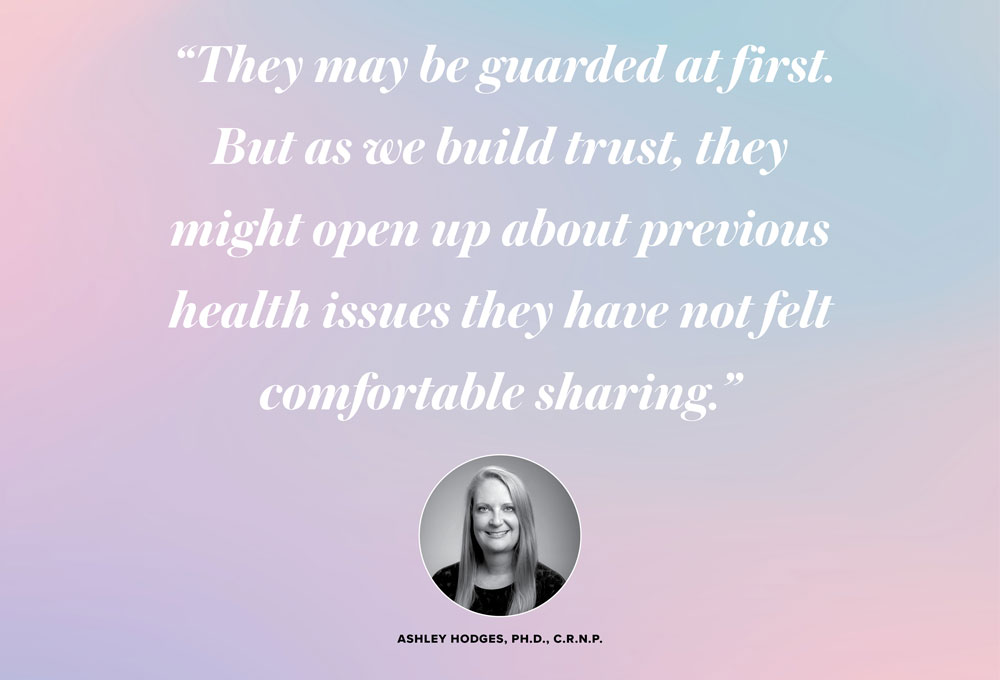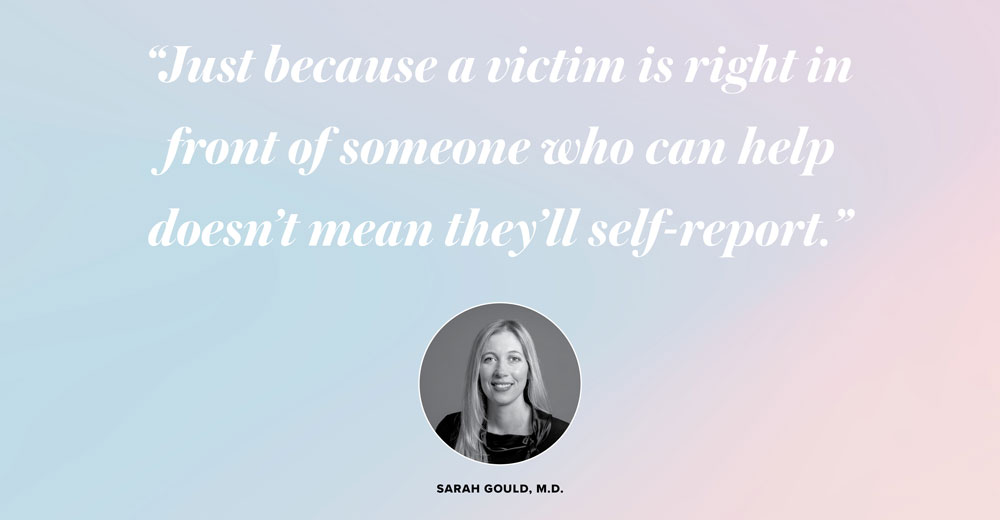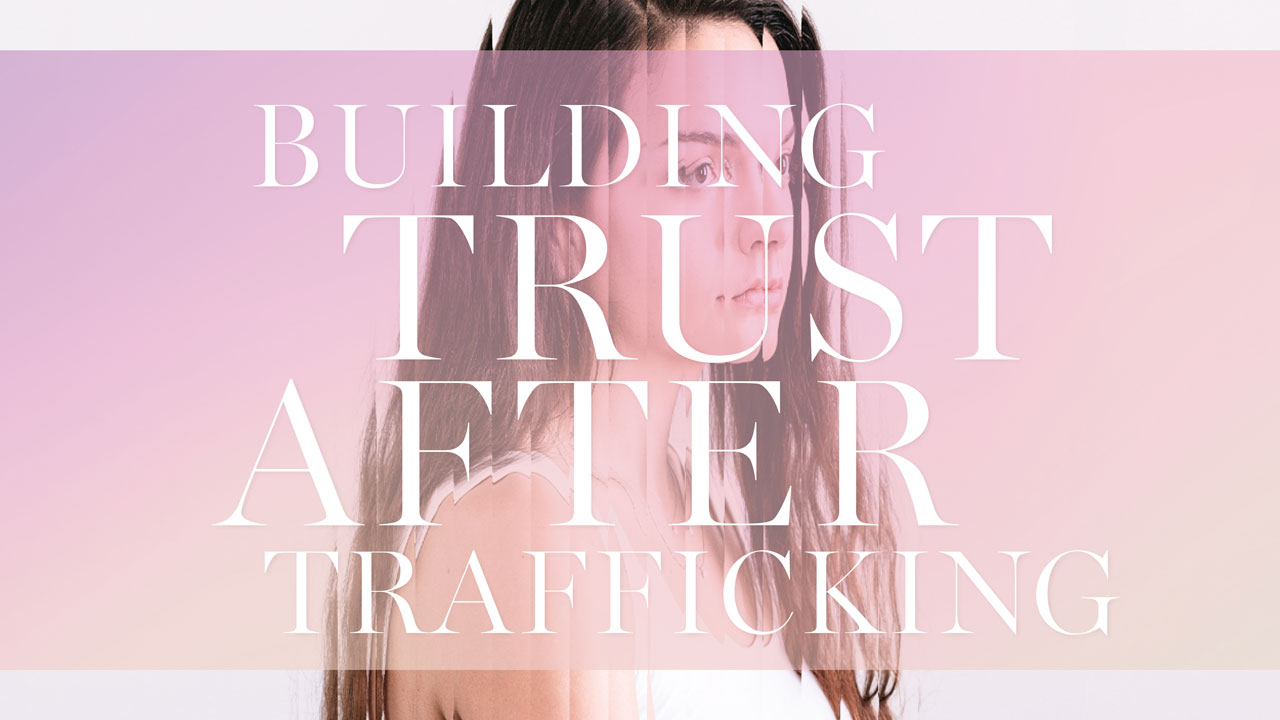During a routine visit to a medical clinic, you might first sit in a row of chairs in the waiting room. Then you follow a nurse down the hall. The nurse weighs you and places a cuff around your arm to check your blood pressure before taking you to an exam room, where you are asked to swap your clothes for a gown. You sit on the exam table and wait. When the clinician enters the room, she shakes your hand.
For patients who have been victims of trauma—specifically human trafficking—this seemingly benign sequence of events could trigger intense feelings of vulnerability. Even the arrangement of the waiting room chairs can spark anxiety: If a patient has to wait with her back to the door, for example, she might dread that someone will sneak up behind her.
The fear is enough to make some trafficking survivors avoid clinical settings altogether, which means they don’t receive the care they need. Fortunately, a growing group of UAB health professionals have become advocates for “trauma-informed care.” It’s a completely different way of running a clinic—one that “focuses on partnering with your patient, understanding their background, and then modifying the way you provide care based on their trauma,” says Ashley Hodges, Ph.D., C.R.N.P., associate dean for graduate clinical education in the School of Nursing.
Rethinking care
Hodges and UAB nursing instructor Lauren Mays, D.N.P., C.R.N.P., put this approach into practice each week at the WellHouse, a nonprofit, faith-based residential shelter where female survivors of human sex trafficking can heal mentally, spiritually, and physically. In an on-site School of Nursing clinic, Hodges and Mays care for women who may be malnourished and suffering from substance use, post-traumatic stress disorder, suicidal thoughts, gynecological complications, dental issues, and general aches and pains—sometimes from old broken bones healing improperly—among other conditions. Some of the women have been trafficked for decades.
Hodges greets the patients in the exam room, but not with a handshake like most health providers do. No touching without consent is a key rule for trauma-informed care, she explains. “I would never touch them unless I ask their permission. They haven’t had a voice in who touches them and who does what to them in a long time.”
The same rule applies to other aspects of a routine physical exam. “To take blood pressure, I ask permission”—which is different from simply telling the patient that she’s going to do it, Hodges emphasizes. Nor would she ask them to remove their clothes during the first exam unless it is absolutely pressing.
“I want them to see this as a partnership,” Hodges says. “I want them to trust us.” But that takes time—which is OK, she notes. Hodges explains to patients that they have the right to privacy in their health care, and she listens closely to them. “They may be guarded at first,” Hodges notes. “But as we build trust, they might open up about previous health issues they have not felt comfortable sharing.”
One WellHouse resident, who requested anonymity to protect her privacy, says it took about three visits to the clinic to start feeling comfortable. Hodges is “understanding—not judgmental,” which eased the embarrassment she felt when she first arrived, the resident says. She also appreciates that Hodges is thorough in her explanations and is willing to answer any questions. It had been a while since the resident had seen a health-care provider, and back then, “it was always quick,” she recalls. “It was like, ‘Here’s what we’re doing. OK, bye.’ There was no sit-down conversation.” Hodges, on the other hand, “never tried to rush me. She listened to everything I had to say.”

A partnership for survivors
Hodges didn’t invent trauma-informed care, but it has become her passion. “I have always been drawn to caring for patients from all walks of life who really need help,” she says. Because many of them were women in crisis, Hodges began educating herself about trauma-informed care and fine-tuning it for survivors of sex trafficking.
She began providing care to women at the WellHouse, located in St. Clair County, in 2018. Nearly six years earlier, Nancy Worthington had read about a nationwide FBI sex trafficking sting that recovered 105 teens from traffickers across the country. In Birmingham, three juveniles were recovered—and the youngest was 13. “We had been blind to it,” Worthington says. “I couldn’t believe this was happening in my own city.” She and her husband soon got involved with the WellHouse. Today he’s the chair of the board of directors while she volunteers and leads Bible studies for residents.
Over time, Worthington noticed the struggles the WellHouse faced in providing care for the women. The residents rode long distances in a van to reach health providers and then had to wait to get picked up again. And there was no guarantee the women would see the same caregiver at each visit.
When Worthington, who is a member of the School of Nursing’s Board of Visitors, described the WellHouse’s challenges, Doreen Harper, Ph.D, R.N., the Fay B. Ireland Endowed Chair for the Dean of the School of Nursing, asked if a UAB nurse practitioner could help provide care. That discussion led Worthington and her husband to establish a UAB endowment to support the WellHouse nursing clinic, which offers residents convenient access to primary care, women’s health care, behavioral and mental health care, and urgent care, plus referrals to other UAB providers as needed.
“It has been an absolute game changer,” Worthington says. Residents “know they are going to see the same person—a woman—every week. She cares for them with tenderness and understanding of their mindset.”
Treating the youngest victims
When victims of human trafficking are pulled out of danger, “they might be acutely psychotic, suicidal, addicted to drugs, withdrawing,” says Sara Gould, M.D., assistant professor in the departments of Orthopedic Surgery and Emergency Medicine. And those survivors include children.
Gould leads the UAB School of Medicine’s effort to care for pediatric victims of human trafficking—to shepherd them out of crisis before they can go to the Alabama Department of Human Resources, move into a foster home, or return to their families.
UAB already had been caring for these young patients as they stabilized, but in a fragmented way, Gould says. She began leading the charge for change after community advocates suggested a more coordinated approach. “UAB is unique because we have so many subspecialty services, like adolescent psychotherapy, adolescent addiction medicine, and specialty treatment for sexually transmitted diseases,” Gould says. “We are trying to bring everyone together.”
The end goal is to coordinate existing efforts, standardize protocols for identifying and caring for victims, and provide comprehensive medical and psychiatric care. And program coordinator Madeline Morgan, M.D., is key to achieving that. When a pediatric trafficking victim is identified, she will serve as the first point of contact. She will gather whatever information she can about the victim and then help determine the best place for him or her to receive care—either UAB’s pediatric emergency group at Children’s of Alabama or Children’s Hospital Intervention and Prevention Services (also known as the CHIPS Center). Following an evaluation of the young patient’s condition, he or she will be referred to an appropriate specialist if needed. UAB also has partnered with law enforcement agencies and other local organizations so that its initiatives coordinate with community efforts targeting human trafficking.
Everything is in the beginning stages, but UAB is making progress thanks to support from the CACA Foundation, the Junior League of Birmingham, Protective Life Foundation, and the National Center on Sexual Exploitation. “This will be an evolving and transforming process,” Morgan explains.

Eyes open
At the same time, Gould is teaching health-care providers to spot possible pediatric trafficking victims. “Let’s say a 14-year-old comes into the emergency department and is addicted to heroin,” Gould says. “That’s an expensive drug, so we’ll ask, ‘How did you get that drug?’ Just because a victim is right in front of someone who can help doesn’t mean they’ll self-report. A lot of victims don’t realize they’re victims. We’re trying to do better screening of patients as they enter the ER.”
Research published in 2014 revealed that 88 percent of victims saw a health-care provider while they were being trafficked, Hodges says. She notes that asking the right questions can shed more light on someone’s situation and perhaps identify people who need help. “We can ask if they carry an ID or if someone else carries it, what they do for a living, where they sleep at night, what city they are in, and if they can leave their job if they wish,” she explains.
Someone often accompanies them. “They may introduce that person as a friend, an aunt, or a cousin,” Hodges says. “That person may speak frequently for them.”
Providers should check for physical clues as well. Patients often have frequent urinary tract infections or bruises, or they may test positive for sexually transmitted infections or substance abuse. “There’s no one sign,” Hodges says. “It’s about pulling it all together.”
Now Hodges is working to establish a model of trauma-informed care that can be implemented in other practices. And she’s educating health-care providers and clinics across the country about making changes to meet the needs of vulnerable patients.
Hodges recalls a patient who, early on, mentioned she had had several pregnancies. “But the longer she knew me, the more trust developed over time,” Hodges says. “She told me eventually that she had multiple pregnancies terminated by her trafficker. She felt guilty and didn’t want to share that—she didn't even like to acknowledge it. But she realized that to provide care for her, it was important that I knew that. It took probably two months for her to disclose that to me.”
That experience—and many others—illustrate the importance of trauma-informed care and the crucial role health-care providers play in helping victims heal. “My focus is always on providing care to these survivors—and helping other health-care providers to do the same,” Hodges says.
Truths About Trafficking
Human trafficking is a form of modern-day slavery—the use of force, fraud, or coercion to compel a person into commercial sex acts or labor against his or her will, according to the National Human Trafficking Hotline.
The average age of entry into trafficking in the United States is 14, according to the WellHouse.
It is a multibillion-dollar criminal enterprise that stretches around the world. In fact, Interstate 20 is considered a key sex-trafficking corridor.
In 2018, 96 human-trafficking cases, with 246 victims, were reported in Alabama, notes the National Human Trafficking Hotline.
• Learn more about the opportunities for community outreach and care, learning, and discovery in the School of Nursing and the School of Medicine.


